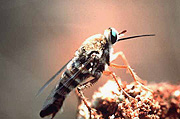By Randy T. Simmons and Kimberly Frost


Introduction
[[{“type”:”media”,”view_mode”:”media_original”,”fid”:”7202″,”attributes”:{“alt”:””,”title”:””,”class”:”media-image”,”typeof”:”foaf:Image”,”style”:”width:180px;height:119px;float:left;margin:0 1em 1em 0;”,”wysiwyg”:1}}]]
Without accurate figures for the costs of the Endangered Species Act, the ongoing public debate over whether the law is effective will be a misinformed one. This study, Accounting for Species, contributes to the debate by analyzing the U.S. Fish and Wildlife Service?s recent report, Three-Year Summary of Federal and State Endangered Species Expenditures, Fiscal Years 1998- 2000. In its report the Fish and Wildlife Service provided some figures on the costs to the government of implementing the act, but the authors of Accounting for Species reveal that the Fish and Wildlife Service report drastically understates the government?s costs of implementing the act and totally fails to include economywide losses.
Anyone seeking to understand the true costs of the Endangered Species Act must look beyond the report. That is what Randy T. Simmons and Kimberly Frost have done in this study prepared at PERC. Simmons and Frost not only reviewed the FWS report but also identified costs that should be included in any serious assessment of the Endangered Species Act. They conclude that an accurate accounting of annual costs attributable to the Endangered Species Act would be in the billions, not millions, of dollars.
Randy T. Simmons heads the department of political science at Utah State University. He is coauthor with William Mitchell of Beyond Politics: Markets, Welfare and the Failure of Bureaucracy, and coeditor with Terry Anderson of The Political Economy of Customs and Culture. He is author of a two-part series on the Endangered Species Act that appeared in Independent Review and he wrote Critical Thinking about Environmental Issues: Endangered Species, a book for high school students published by Greenhaven Press. Simmons received his Ph.D. in political science from the University of Oregon.
Kimberly Frost is a graduate student and research assistant at Utah State University. Frost has conducted writing and research for the Institute for Justice, an organization that supports private property rights and individual liberties. Her studies emphasize natural resource issues and the environment.


